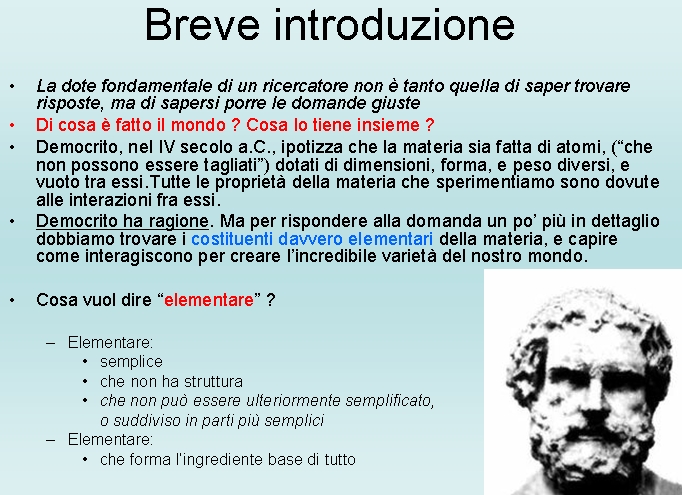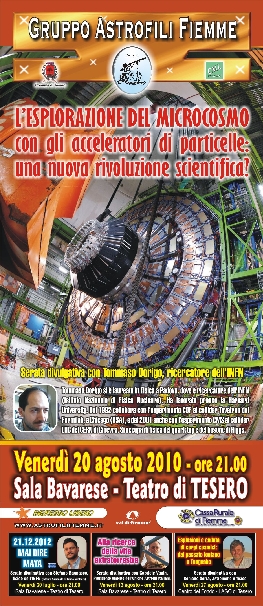
 The first point can be translated as follows: The fundamental gift of a researcher is not to be capable of finding the correct answers, but to be able of posing the right questions. It is something I know very well, but its extent goes beyond the sheer field of pure research. And actually, I do believe that one gets significant benefits by not just being able to pose to oneself the right questions, but to ask questions to others -meaningful, or less so.
The first point can be translated as follows: The fundamental gift of a researcher is not to be capable of finding the correct answers, but to be able of posing the right questions. It is something I know very well, but its extent goes beyond the sheer field of pure research. And actually, I do believe that one gets significant benefits by not just being able to pose to oneself the right questions, but to ask questions to others -meaningful, or less so.I was reminded of my ideas on the matter tonight, during a conversation with my son at dinner. We were talking about the fact that it is important to ask questions if you are being taught something and you do not understand. For a number of reasons.
The first reason is, of course, that you need to ask a question if you want to be taught its answer. But this quite obvious reason is in particular instances outshadowed by more important considerations. I wrote a rather detailed explanation of what I think on the matter in a set of advices to particle-physics wannabes (graduate students, that is) last year, and by re-reading the second part of my own piece, I found it rather to the point, so I shamelessly re-use it here (the first part of the piece is here). What the hell - the web contains a lot of fine material buried here and there, and there is no wrong in digging it out sometimes! Furthermore, I doubt I could write my ideas better than I did last November on a lazy train ride to Turin... So here we go.
In the clip below, I am giving advices to Jane, a 2nd year graduate student who arrives at a lab and tries to survive. Maybe useful to some of you ?
----
In large experiments, you never manage to get to know all your colleagues -there simply is not enough time to do that. You will get to know the names and recognize the face of the physics group conveners, the people with responsibilities, and the few colleagues who do a job similar to yours. On the other hand, you would like -you should like!- to become known and esteemed by your colleagues. Remember, some of them will be the ones who write reference letters for you one day, or those who decide to grant you the right to represent the collaboration at an international conference.
How do you manage to become somebody ? It is not enough to present your work regularly at the relevant physics group, because not many follow that group's activities. So you have to play in all the tables, in a way.
The way to get people to know you, attach your name to your face, and realize you are knowledgeable is, maybe suprisingly, to ask questions at meetings, as often as possible. You do not understand something about a plot your colleague is showing during his talk ? Ask about it. The x-axis labels are missing ? Ask what the heck are the units, even if Groucho's child of five could understand it. You arrive before the last slide and the speaker is saying she measured x with two inverse femtobarns ? Sit down, wait ten seconds for the dust to settle (you do not want them to see you have just arrived), and ask her whether she plans to add more data to improve the measurement. You doze off during the talk and wake up at the Summary slide ? Ask to see slide 7 again (there is always a slide seven, so this is a safe call), and then stare at it pensively for five seconds, finally saying "Ok, I see, thank you".
Of course, you should ensure you do not become a real nuisance, so you need some self-containment. A good rule-of-thumb is the following: ask a question every 30 minutes. A good pace is about three questions per meeting at a meeting with 15 to 30 participants; half that rate should be enough in case of larger audiences -others must ask questions, too!
The examples of questions you may always ask (content-free ones, that is) that I have given above may sound silly, but they work, and they can always be used. Usually, however, you will be at the meeting from the start, with your brain functioning normally. If so, you will have lots of real questions to ask about the work you hear discussed. And most of the times you will be afraid that the questions you are puzzling yourself over are stupid ones: ones with obvious answers, or worse, ones which betray your abysmal ignorance of the whole topic. Surely, you reason, you should avoid making a fool of yourself in front of such large audiences of smart people. Another huge mistake.
My third advice to Jane is the following: ask questions if you do not know the answer, even if you are 99% sure they are dumb ones. Remember, only by asking questions you learn the answer; otherwise, you will remain ignorant. If something is unclear to you, for the love of yourself, put your self-esteem aside and ask the darn thing to the speaker. You think the rest of the audience knows the answer and will think you are a fool ? That is quite wrong! First of all, half of the audience is not smarter than you, and you will become popular among them if you straighten out a point over which they too were puzzling, by putting your face behind the question. Among the knowledgeable other half, a good third will be asleep, another third will be busy with their laptop, and the few others will not care to listen to you. In a 40-strong audience, you may expect that maybe three or four people really understand your question, know the answer, and judge you for your ignorance; they will think you are uninformed, but will nevertheless appreciate that you had the balls to ask. The others will raise their eyes from their laptops or turn them to you, stare at you while you ask the question, and go back to their occupation. That is added value: 90% of the audience has identified you as a person who participates actively to meetings.
And there is more. Jane will be surprised to know that every once in a while her question will turn out to not be dumb at all. At the beginning, and for a while, this will happen rarely; but as Jane's experience grows, she will find out that the exercise of asking questions does not always produce answers: at times, she will manage to put her finger on a weak point of the work which is being presented, and that will really impress the people in the audience. Suggesting workarounds and improvements is harder to do, but this, too, will come from experience, and from the habit of speaking one's mind at meetings. Meetings, Jane should not forget, are places where people should be able to discuss freely. It is the conveners' job to moderate the discussion, if needed; participants should not self-moderate themselves to the point of keeping their mouth shut if they have something to say!




Comments